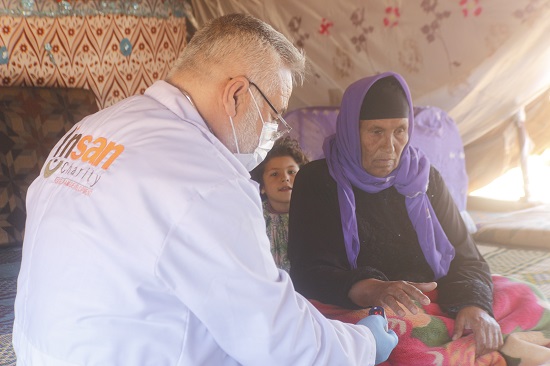1 August 2021 – With the kind support of the European Civil Protection and Humanitarian Aid Operations (ECHO) WHO was able to continue to support INSAN that means ‘human’ in Arabic. INSAN, is a non-profit organization that offers psychosocial support to Syrian refugees, plus training to those working in refugee camps. It was set up by a group of psychologists back in 2012. We cannot stress how important the work of INSAN is on the ground and to the people most in need across northwest Syria.
With ECHO funding INSAN was able to operate from mobile clinics supported by WHO through war-torn northwest Syria to dramatically increase access to those that need life-saving and life-sustaining, coordinated, equitable health services. One such story is that of Um Muhammad in 2021.
Um Mohammad's story

Um Muhammad is a 71 year old woman who was displaced from eastern Almaara 3 years ago and moved to the Al-Jeb camp in Maaret Tamasrin. As an elderly lady she suffers from health problems that include joint and bone pain, in addition to high blood pressure.
One day as the INSAN mobile clinic was passing, her son brought her to be examined by a doctor. The doctor checked her and measured her blood pressure which he found high, so he immediately gave her medicine to reduce it. The doctor also referred her to specialized hospital in order to receive cardiac consultation. After several days, the nurse of the mobile clinic visited Um Muhammad in her tent to follow up on her case and to check her pressure again and make sure that she had recovered. This is the level of medical services and respect that all people deserve, especially the elderly. WHO would like to thank ECHO for their generous and continuing support of INSAN.
Um Ahmad's story
Um Ahmad was displaced from her home so many times across the Aleppo governorate to eventually Idleb where she has finally settled down in Allyth Camp in Haranbush. Now she has twins aged 6 months old. When the INSAN mobile clinic was in the camp she came to the clinic to have her children screened in its nutrition clinic. Community health workers screened the 2 children using the mid-upper arm circumference method and discovered that they both suffered from malnutrition. They instantly provided curative nutrition supplies and dietary instructions to be followed by their mother. They also set a follow-up date to return to the clinic to monitor both children until they had fully recovered. All people deserve this level of treatment and care, and particularly the most vulnerable, such as mothers and young children. WHO would like to thank ECHO for their generous and continuing support of INSAN.
 One of Um Ahmad's twin girls being screened by mid-upper arm circumference
One of Um Ahmad's twin girls being screened by mid-upper arm circumference


